Unit 5 Do you have a soccer ball? (Section A &B) 同步课件 (共38张PPT)
文档属性
| 名称 | Unit 5 Do you have a soccer ball? (Section A &B) 同步课件 (共38张PPT) | 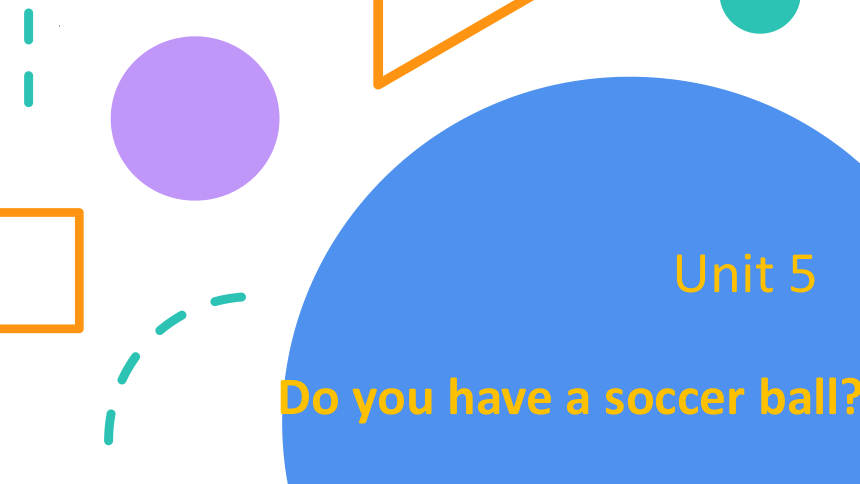 | |
| 格式 | pptx | ||
| 文件大小 | 5.1MB | ||
| 资源类型 | 教案 | ||
| 版本资源 | 人教新目标(Go for it)版 | ||
| 科目 | 英语 | ||
| 更新时间 | 2022-07-23 13:29:33 | ||
图片预览

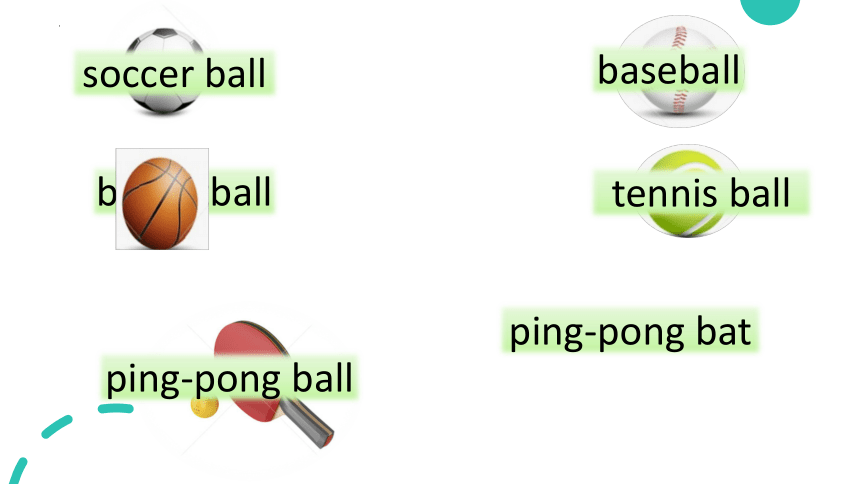
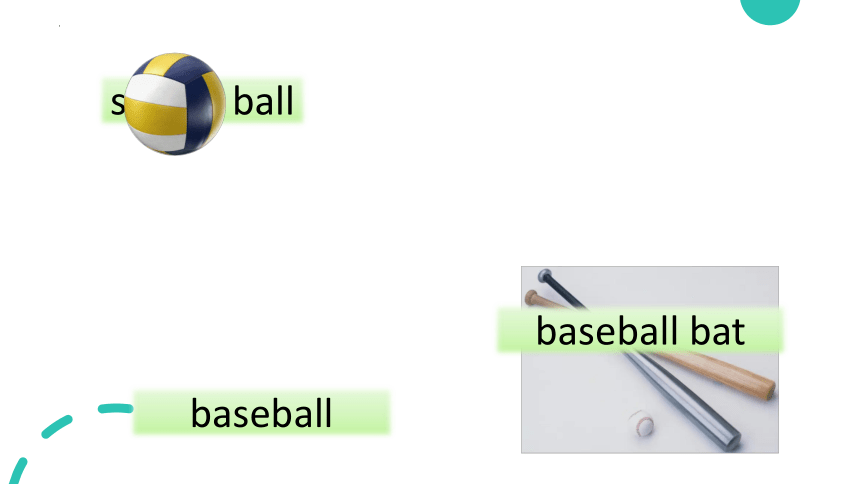
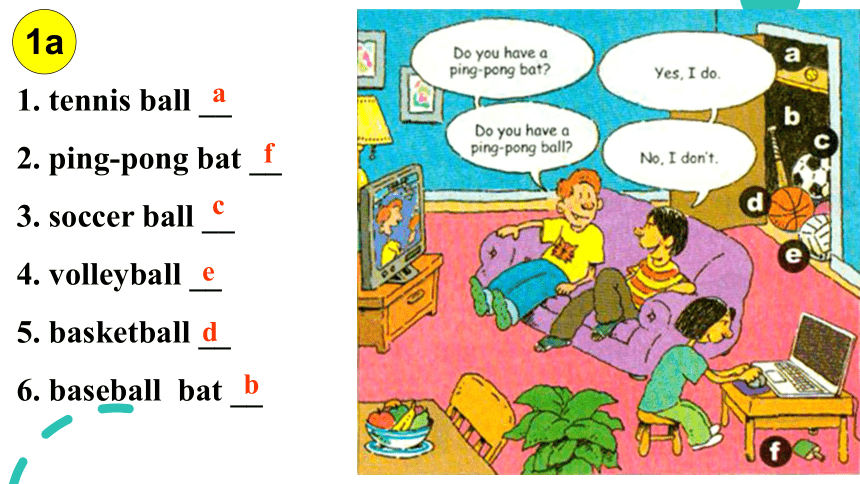
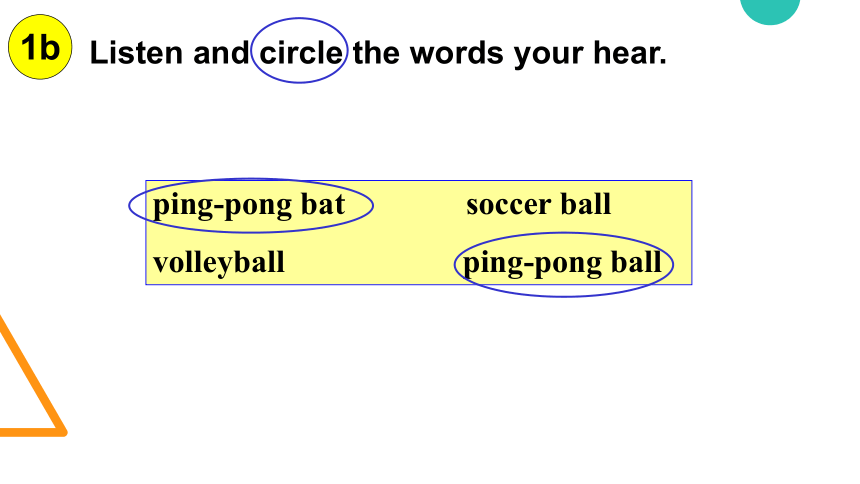
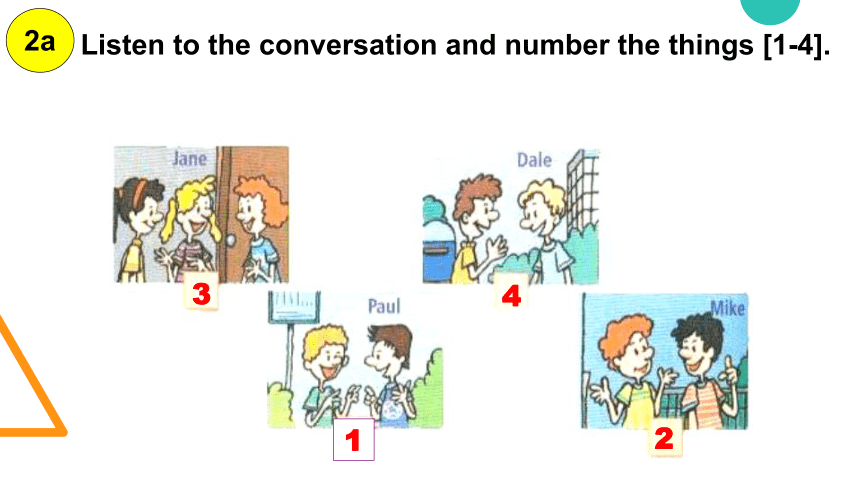
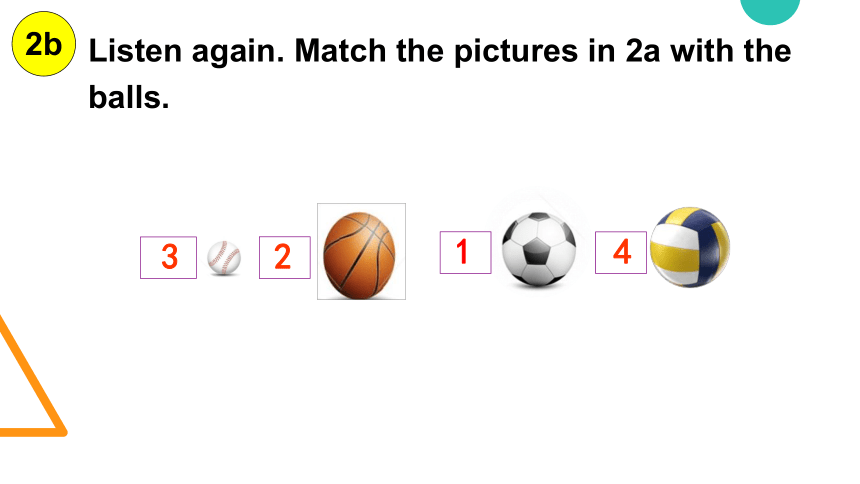
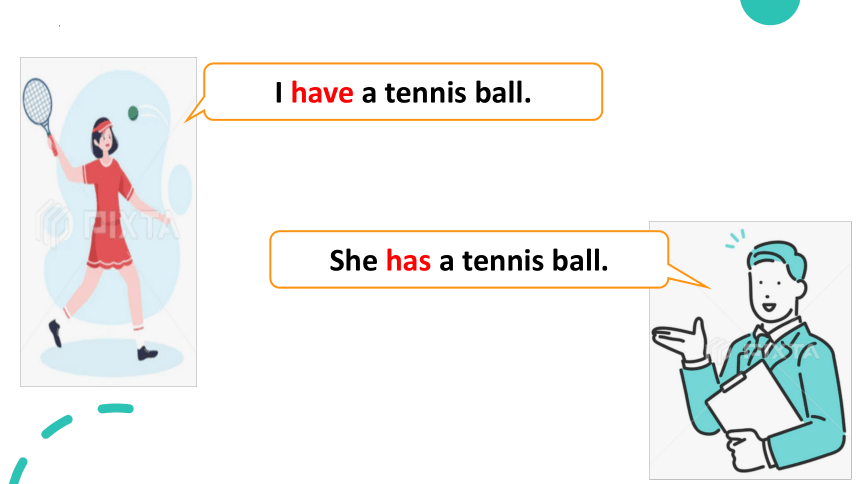
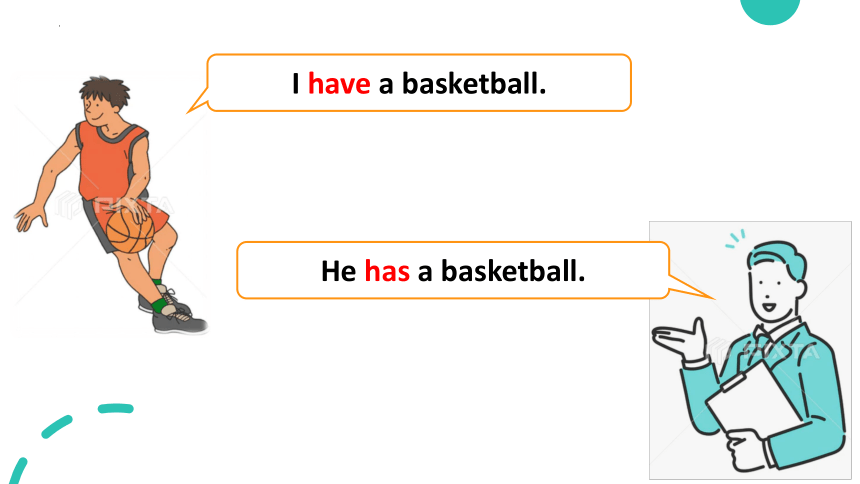
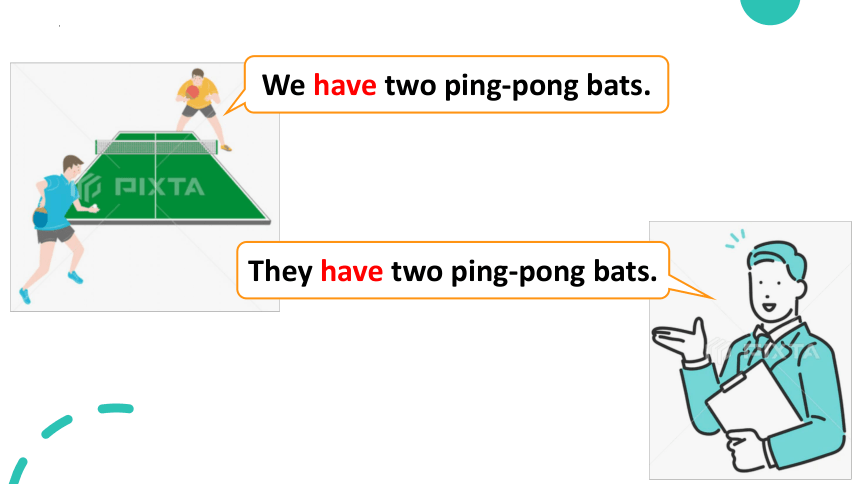
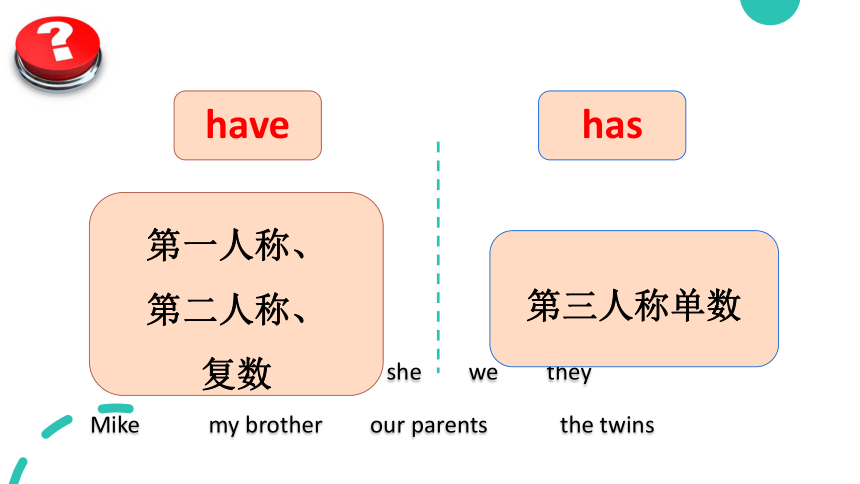
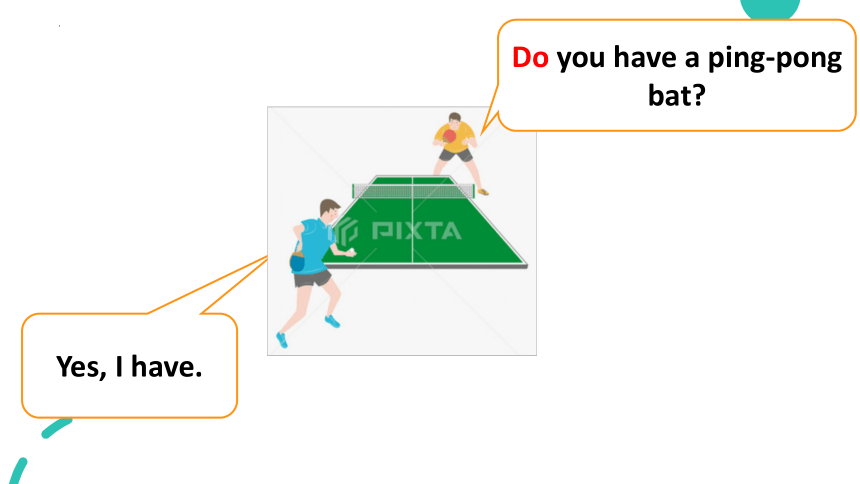
文档简介
(共38张PPT)
Unit 5
Do you have a soccer ball
soccer ball
basketball
baseball
tennis ball
ping-pong ball
ping-pong bat
soccer ball
baseball bat
baseball
1. tennis ball __
2. ping-pong bat __
3. soccer ball __
4. volleyball __
5. basketball __
6. baseball bat __
a
f
c
e
d
b
1a
Listen and circle the words your hear.
1b
ping-pong bat soccer ball
volleyball ping-pong ball
Listen to the conversation and number the things [1-4].
1
2a
3
2
4
Listen again. Match the pictures in 2a with the balls.
2b
2
3
4
1
I have a tennis ball.
She has a tennis ball.
He has a basketball.
I have a basketball.
We have two ping-pong bats.
They have two ping-pong bats.
have
has
I
you
he
she
we
they
Mike
my brother
our parents
the twins
第一人称、
第二人称、
复数
第三人称单数
Yes, I have.
Do you have a ping-pong bat
No, I don’t.
Do you have a ping-pong ball
Does she have a tennis ball
Does he have a baseball
Do they have volleyballs
Yes, she does.
No, he doesn’t.
No, they doesn’t.
do
does
I
you
he
she
we
they
Mike
my brother
our parents
the twins
第一人称、
第二人称、
复数
第三人称单数
do not=don’t
does not=doesn’t
Write each word in the correct place in the chart.
3a
do does
he
I
they
you
we
she
it
Eric
Fill in the blanks with do or does. Then practice the conversation with you partner.
3b
Do
do
Do
do
Does
Does
doesn’t
does
Cindy: Hey, Helen, let’s go! We’re late.
Helen: OK.
Cindy: Do you have the baseball
Helen: Yes, I do. It’s in my bag.
Cindy: And where’s our baseball bat
Helen: Bill has it.
Cindy: Oh, yeah. And do you have your jacket
Helen: Oh, no, I don’t. It’s on the chair. Let me get it.
Cindy: And your hat, too!
Helen: OK, I have my jacket and hat. Let’s go.
Role-play the conversation.
Let’s go! 让我们走吧!
Let’s = Let us
let sb. do sth. “让某人做某事”
Let me get it.
Let’s play volleyball.
Let me do it.
Let her guess.
Do you have the baseball 你有棒球吗?
Do you have … “你有…吗?”,询问物品的所属关系。
肯定回答:Yes, I do.
否定回答:No, I don’t.
Does she/ he have…
Do we/ you/ they have…
一般疑问句结构。
一般疑问句
Do+第一人称、第二人称、第三人称复数+ 动词原形+其他?
肯定回答:Yes, sb. do.
否定回答:No, sb. don’t.
--- Do they like ping-pong
--- Yes, they do.
--- Do we have ping-pong bats
--- No, we don’t.
一般疑问句
Does+第三人称单数+ 动词原形+其他?
肯定回答:Yes, sb. does.
否定回答:No, sb. doesn’t.
--- Does he have a tennis ball
--- No, he doesn’t.
--- Does Mike like tennis
--- Yes, he does.
play basketball
play tennis
play ping-pong
play baseball
play volleyball
interesting
relaxing
difficult
boring
fun
fun
1. interesting __ 3. fun __ 5. relaxing __
2. boring __ 4. difficult __
√
√
√
√
1b
Listen and check (√) the description words you hear in 1a.
play computer games ___________
play volleyball ___________
watch TV ___________
play basketball ___________
Listen again. What does Paul say about these activities. Choose a word from 1a to fill in each blank.
interesting
difficult
boring
fun
1c
Who has a soccer ball
Frank Brown:
I don’t have a soccer ball, but my brother Alan does. We go to the same school and we love soccer. We play it at school with our friends. It’s relaxing.
Gina Smith:
Yes, I do. I have two soccer balls, three volleyballs, four basketballs, and five baseballs and bats. I love sports, but I don’t play them -- I only watch them on TV!
Wang Wei:
No, I don’t. Soccer is difficult. I like ping-pong. It’s easy for me. I have three ping-pong balls and two ping-pong bats. After class, I play ping-pong with my classmates.
Who do you think says these sentences Check (√) F for Frank, G for Gina or W for Wang Wei.
1. I play ping-pong with my classmates after class.
2. I have soccer balls, basketballs, volleyballs and baseballs.
3. My brother has a soccer ball but I don’t.
4. I only watch sports on TV.
5. Soccer is not easy for me.
6. My brother and I are in the same school.
F
G
W
2c
√
√
√
√
√
√
I don’t have a soccer ball, but my brother Alan does.
我没有足球,但是我哥哥Alan有。
but “但是”,表转折。
此处用do来代替上文出现过的动词或动词词组,以避免重复。在本句中,does代替上文出现过的have a soccer ball。
Linda have a baseball bat, but I don’t.
Jack doesn’t play volleyball, but his sister does.
We go to the same school and we love soccer.
我们去相同的学校,而且我们都喜欢足球。
love “喜欢、喜爱” ; love sb./sth. “喜欢某人/某事”。
I love my mother.
love me, love my dog.
like “喜欢” ; like sb./sth. 表示对某事物的兴趣或爱好。 I like English.
The coat is nice. I like it.
love表示的程度比 like深。
I only watch them on TV! 我仅仅在电视上看他们!
watch …on TV “在电视上看…”
We watch cartoons on TV.
My father watches football games on TV.
Soccer is difficult. I like ping-pong. It’s easy for me.
足球是困难的。我喜欢乒乓球。它对我来说是容易的。
difficult “困难的” , easy “容易的、不费力的” 。
sth. is difficult for sb.表示某物对某人来说是困难的。
sth. is easy for sb. 表示某物对某人来说是容易的。 English is difficult for her.
Basketball is easy for me.
After class, I play ping-pong with my classmates.
下课后,我和我的同学打乒乓球。
after class “下课后” 。
after school
after lunch
after dinner
用括号内所给词的适当形式填空。
1. — Let’s go to the park.
— Good idea. I think it’s ________ (relax).
2. My cousin _____ (have) a new dictionary.
3. Look! There are five __________ (volleyball) under the table.
4. It’s easy ________ (play) ping-pong.
5. Jack ____________ (not have) a ping-pong bat.
relaxing
has
volleyballs
to play
doesn’t have
6. Let’s go and ask _______ (they) about it.
7. We play basketball with _____ (we) friends at school.
8. — How about playing computer games
— That ________ (sound) fun.
9. Would you like to play ______ (sport) with me
10. My cousin and I ___ (be) in the same school.
our
sounds
sports
are
them
basketball
football
hockey
swimming
ping-pong
diving
tennis
boxing
gymnastic
谢谢
Unit 5
Do you have a soccer ball
soccer ball
basketball
baseball
tennis ball
ping-pong ball
ping-pong bat
soccer ball
baseball bat
baseball
1. tennis ball __
2. ping-pong bat __
3. soccer ball __
4. volleyball __
5. basketball __
6. baseball bat __
a
f
c
e
d
b
1a
Listen and circle the words your hear.
1b
ping-pong bat soccer ball
volleyball ping-pong ball
Listen to the conversation and number the things [1-4].
1
2a
3
2
4
Listen again. Match the pictures in 2a with the balls.
2b
2
3
4
1
I have a tennis ball.
She has a tennis ball.
He has a basketball.
I have a basketball.
We have two ping-pong bats.
They have two ping-pong bats.
have
has
I
you
he
she
we
they
Mike
my brother
our parents
the twins
第一人称、
第二人称、
复数
第三人称单数
Yes, I have.
Do you have a ping-pong bat
No, I don’t.
Do you have a ping-pong ball
Does she have a tennis ball
Does he have a baseball
Do they have volleyballs
Yes, she does.
No, he doesn’t.
No, they doesn’t.
do
does
I
you
he
she
we
they
Mike
my brother
our parents
the twins
第一人称、
第二人称、
复数
第三人称单数
do not=don’t
does not=doesn’t
Write each word in the correct place in the chart.
3a
do does
he
I
they
you
we
she
it
Eric
Fill in the blanks with do or does. Then practice the conversation with you partner.
3b
Do
do
Do
do
Does
Does
doesn’t
does
Cindy: Hey, Helen, let’s go! We’re late.
Helen: OK.
Cindy: Do you have the baseball
Helen: Yes, I do. It’s in my bag.
Cindy: And where’s our baseball bat
Helen: Bill has it.
Cindy: Oh, yeah. And do you have your jacket
Helen: Oh, no, I don’t. It’s on the chair. Let me get it.
Cindy: And your hat, too!
Helen: OK, I have my jacket and hat. Let’s go.
Role-play the conversation.
Let’s go! 让我们走吧!
Let’s = Let us
let sb. do sth. “让某人做某事”
Let me get it.
Let’s play volleyball.
Let me do it.
Let her guess.
Do you have the baseball 你有棒球吗?
Do you have … “你有…吗?”,询问物品的所属关系。
肯定回答:Yes, I do.
否定回答:No, I don’t.
Does she/ he have…
Do we/ you/ they have…
一般疑问句结构。
一般疑问句
Do+第一人称、第二人称、第三人称复数+ 动词原形+其他?
肯定回答:Yes, sb. do.
否定回答:No, sb. don’t.
--- Do they like ping-pong
--- Yes, they do.
--- Do we have ping-pong bats
--- No, we don’t.
一般疑问句
Does+第三人称单数+ 动词原形+其他?
肯定回答:Yes, sb. does.
否定回答:No, sb. doesn’t.
--- Does he have a tennis ball
--- No, he doesn’t.
--- Does Mike like tennis
--- Yes, he does.
play basketball
play tennis
play ping-pong
play baseball
play volleyball
interesting
relaxing
difficult
boring
fun
fun
1. interesting __ 3. fun __ 5. relaxing __
2. boring __ 4. difficult __
√
√
√
√
1b
Listen and check (√) the description words you hear in 1a.
play computer games ___________
play volleyball ___________
watch TV ___________
play basketball ___________
Listen again. What does Paul say about these activities. Choose a word from 1a to fill in each blank.
interesting
difficult
boring
fun
1c
Who has a soccer ball
Frank Brown:
I don’t have a soccer ball, but my brother Alan does. We go to the same school and we love soccer. We play it at school with our friends. It’s relaxing.
Gina Smith:
Yes, I do. I have two soccer balls, three volleyballs, four basketballs, and five baseballs and bats. I love sports, but I don’t play them -- I only watch them on TV!
Wang Wei:
No, I don’t. Soccer is difficult. I like ping-pong. It’s easy for me. I have three ping-pong balls and two ping-pong bats. After class, I play ping-pong with my classmates.
Who do you think says these sentences Check (√) F for Frank, G for Gina or W for Wang Wei.
1. I play ping-pong with my classmates after class.
2. I have soccer balls, basketballs, volleyballs and baseballs.
3. My brother has a soccer ball but I don’t.
4. I only watch sports on TV.
5. Soccer is not easy for me.
6. My brother and I are in the same school.
F
G
W
2c
√
√
√
√
√
√
I don’t have a soccer ball, but my brother Alan does.
我没有足球,但是我哥哥Alan有。
but “但是”,表转折。
此处用do来代替上文出现过的动词或动词词组,以避免重复。在本句中,does代替上文出现过的have a soccer ball。
Linda have a baseball bat, but I don’t.
Jack doesn’t play volleyball, but his sister does.
We go to the same school and we love soccer.
我们去相同的学校,而且我们都喜欢足球。
love “喜欢、喜爱” ; love sb./sth. “喜欢某人/某事”。
I love my mother.
love me, love my dog.
like “喜欢” ; like sb./sth. 表示对某事物的兴趣或爱好。 I like English.
The coat is nice. I like it.
love表示的程度比 like深。
I only watch them on TV! 我仅仅在电视上看他们!
watch …on TV “在电视上看…”
We watch cartoons on TV.
My father watches football games on TV.
Soccer is difficult. I like ping-pong. It’s easy for me.
足球是困难的。我喜欢乒乓球。它对我来说是容易的。
difficult “困难的” , easy “容易的、不费力的” 。
sth. is difficult for sb.表示某物对某人来说是困难的。
sth. is easy for sb. 表示某物对某人来说是容易的。 English is difficult for her.
Basketball is easy for me.
After class, I play ping-pong with my classmates.
下课后,我和我的同学打乒乓球。
after class “下课后” 。
after school
after lunch
after dinner
用括号内所给词的适当形式填空。
1. — Let’s go to the park.
— Good idea. I think it’s ________ (relax).
2. My cousin _____ (have) a new dictionary.
3. Look! There are five __________ (volleyball) under the table.
4. It’s easy ________ (play) ping-pong.
5. Jack ____________ (not have) a ping-pong bat.
relaxing
has
volleyballs
to play
doesn’t have
6. Let’s go and ask _______ (they) about it.
7. We play basketball with _____ (we) friends at school.
8. — How about playing computer games
— That ________ (sound) fun.
9. Would you like to play ______ (sport) with me
10. My cousin and I ___ (be) in the same school.
our
sounds
sports
are
them
basketball
football
hockey
swimming
ping-pong
diving
tennis
boxing
gymnastic
谢谢
同课章节目录
- starters 预备篇(2012秋审查)
- Unit 1 Good morning !
- Unit 2 What’s this in English?
- Unit 3 What color is it ?
- Unit 1 My name's Gina.
- Section A
- Section B
- Unit 2 This is my sister.
- Section A
- Section B
- Unit 3 Is this your pencil?
- Section A
- Section B
- Unit 4 Where's my schoolbag?
- Section A
- Section B
- Unit 5 Do you have a soccer ball?
- Section A
- Section B
- Unit 6 Do you like bananas?
- Section A
- Section B
- Unit 7 How much are these socks?
- Section A
- Section B
- Unit 8 When is your birthday?
- Section A
- Section B
- Unit 9 My favorite subject is science.
- Section A
- Section B
